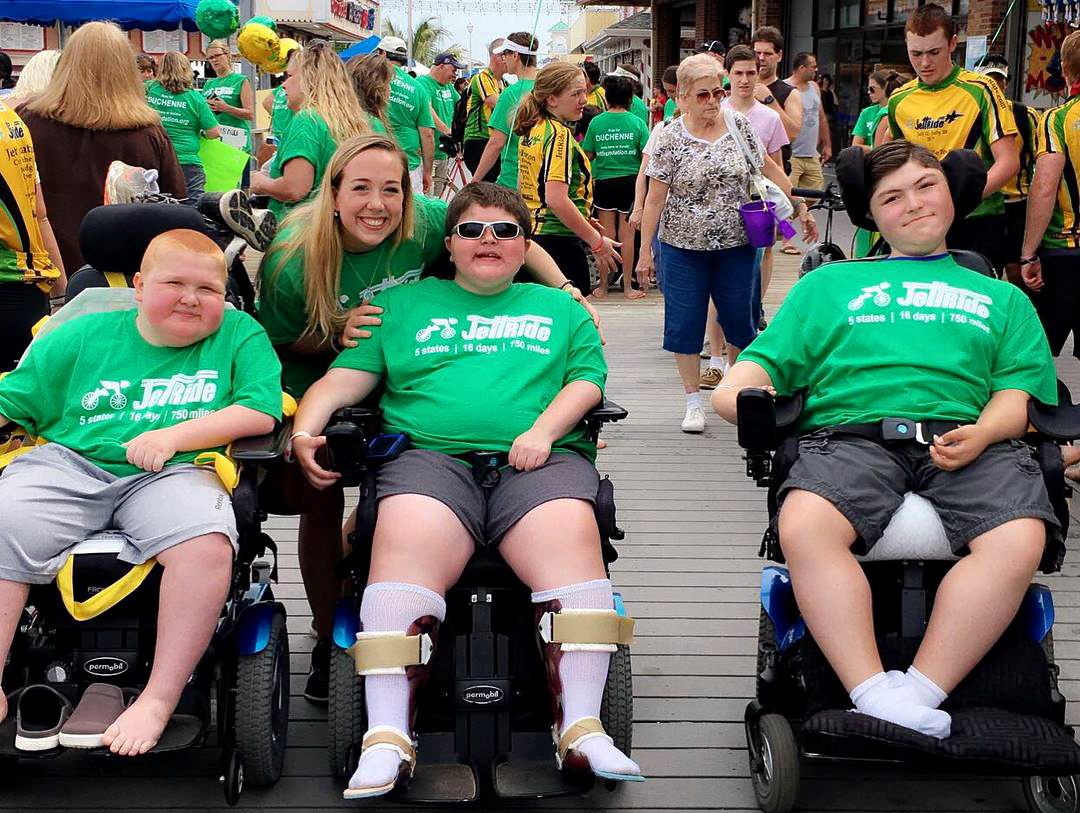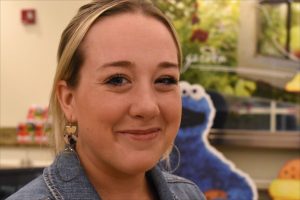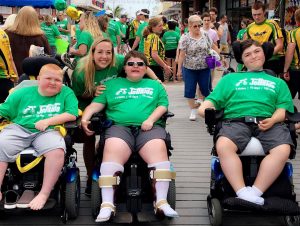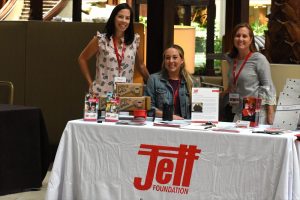Jett Foundation’s Mission: ‘Making People Care About Duchenne’
Written by |

Danielle Edwards, her brother Tanner and two other boys with DMD at the Jett Foundation's JettRide 2019 finish line party in Point Pleasant, N.J. (Photo courtesy of Danielle Edwards)
Many people are inspired by a son or brother with Duchenne muscular dystrophy (DMD). When it comes to Danielle Edwards, she’s literally made the disease her career.
Edwards, 26, is the community engagement manager at the Jett Foundation, a Massachusetts charity that helps families deal with the emotional and financial difficulties associated with Duchenne.
As the oldest of six siblings, Edwards feels a special bond with her 15-year-old brother, Tanner, who has Duchenne.
“I was 15 when my parents came home from the doctor with my brother, who was 4, and told me the diagnosis,” she said. “I’ll never forget the look on their faces.”
Edwards, who’s worked at the Jett Foundation for the past three years, spoke to Muscular Dystrophy News Today on the sidelines of the 2019 Parent Project Muscular Dystrophy (PPMD) annual conference in Orlando, Florida.
“This disease — as much as I hate it — is a huge part of who I am today. Everything I do is for Duchenne, not just for my brother anymore, but for all the boys I’ve met along this journey,” she said. “If I’m only going to have a certain amount of time left with my brother, I want that time to be as meaningful as possible.”
Connect with other people and share tips on how to manage Muscular Dystrophy in our forums!
The Jett Foundation was established in 2001 by Christine McSherry of Plymouth, Massachusetts. It works with at least 1,000 families per year, has five full-time staffers and operates on a $2 million annual budget.
“Christine was just like every other newly diagnosed mom,” Edwards said of McSherry, whose 23-year-old son, Jett, has DMD. “She found herself the day after on the library floor pulling out every book she could find. What started out as a few friends around the kitchen table turned out to be the Jett Foundation.”
Camp Promise teaches independence
Edwards studied communications at Mount St. Mary’s College in Emmitsburg, Maryland, and later interned at the Make-A-Wish Foundation. She eventually became a sales rep for a Baltimore staffing firm, but left to work for the foundation full-time.
“When you’re going up against cancer and the big diseases like Alzheimer’s, the challenge is this: ‘How do I make people care about Duchenne?’” she said. “I tell my story. I’m a sibling who’s looking to provide education, opportunities and empowerment for families.”
Edwards said a big part of her job is organizing the charity’s educational family workshops — about eight of them a year — featuring Duchenne experts, clinicians, drug companies and others.
The foundation also hosts Camp Promise, a free, week-long summer camp for Duchenne patients and those with spinal muscular atrophy and similar diseases. Camp Promise has locations in Empire, Colorado; Amston, Connecticut; and Vaughn, Washington.
In addition, it offers internships to young men with Duchenne who, despite their physical limitations, can work in social media, graphic design and other jobs that require computer skills.
“Since boys are outliving their life expectancy, we want to foster an independent lifestyle,” she said. “It starts with the first diagnosis: how to better prepare yourself for this disease by finding the right doctors, learning about clinical research, physical therapy, stretching, when you should start using cough assist for your child, and having that conversation about steroids with your doctor.”
There’s also the Jett Giving Fund, a matching gift program in which the foundation pays for accessibility equipment that’s often denied by insurance companies. These can range from a stair lift, which costs anywhere from $7,000 to $11,000, to a power wheelchair, which can sell for $50,000 to $70,000.
To date, the foundation has donated handicapped-accessible vans, stair lifts, rotating beds and other pieces of equipment.
Edwards: ‘Have some compassion’
As for Tanner, things took a turn for the worse when, at age 9, he hit a curb and was tossed out of his wheelchair, shattering his femur.
“When my brother broke his leg, my parents weren’t prepared for the financial burden,” she said. “We started the program because we had heard of a mother with two boys who didn’t have a way to transport her sons to get care. She started a GoFundMe page to get money, and a few weeks later, she lost one of her sons to Duchenne. We never want another family to go through that.”
For now, Edwards said her brother is on Emflaza (deflazacort), a steroid originally developed by Marathon Pharmaceuticals, which was later acquired by PTC Therapeutics. Tanner also takes Prozac (fluoxetine) for anxiety as well as vitamin D. He has been participating in the FibroGen clinical trial (NCT02606136) for the company’s anti-CTGF [connective tissue growth factor] antibody, pamrevlumab, since 2017.
In the past three years, the Jett Foundation has “really taken off,” said Edwards, thanks to a number of corporate grants.
“We are moving so quickly in this scientific and clinical trial stage that most of these parents can’t even tell you what gene therapy is,” she said. “Some parents simply don’t have all the information they need. They’re reading tweets and Facebook posts.”
To that end, the foundation has developed a packet for families of newly diagnosed DMD boys. It includes a welcome letter from the Jett Foundation, advice on how to discuss Duchenne with a teacher, and information on health insurance. It also has designated 15 people as “community ambassadors” who are well-versed in clinical trials and other matters involving DMD patients.
“People know what they should do, but they don’t really do it,” Edwards said. “Do you put your kid on steroids or don’t you? I look at the kids who are living the longest. In the past 10 years, we’ve gone from zero options to hundreds. Now many boys aren’t getting into clinical trials because they’re non-ambulatory.”
Edwards ended our interview with an appeal for compassion from the drugmakers researching treatments for Duchenne.
“Companies need to recognize that patients are their products and should care about them — whether they’re 5 years old or 25,” she said. “Everyone has to make money, but they should be more eager to understand the emotional and financial burdens our families go through.”








